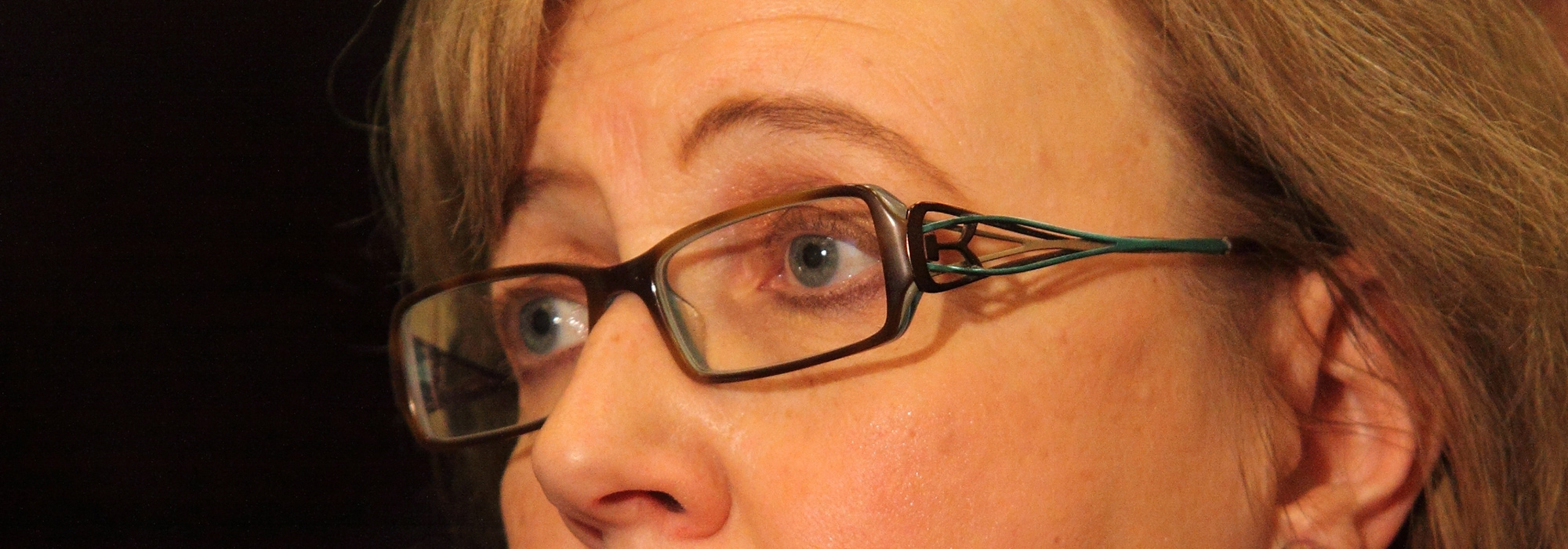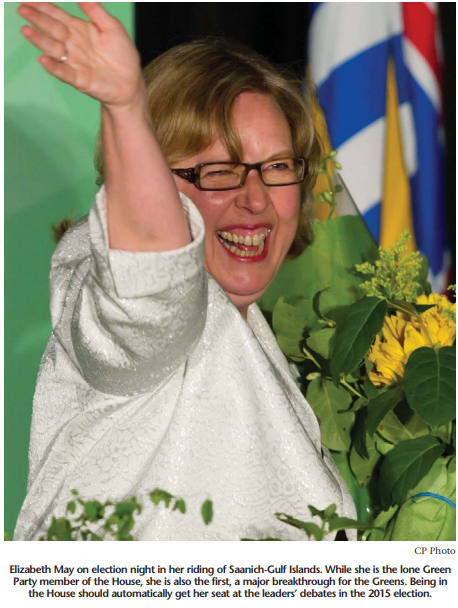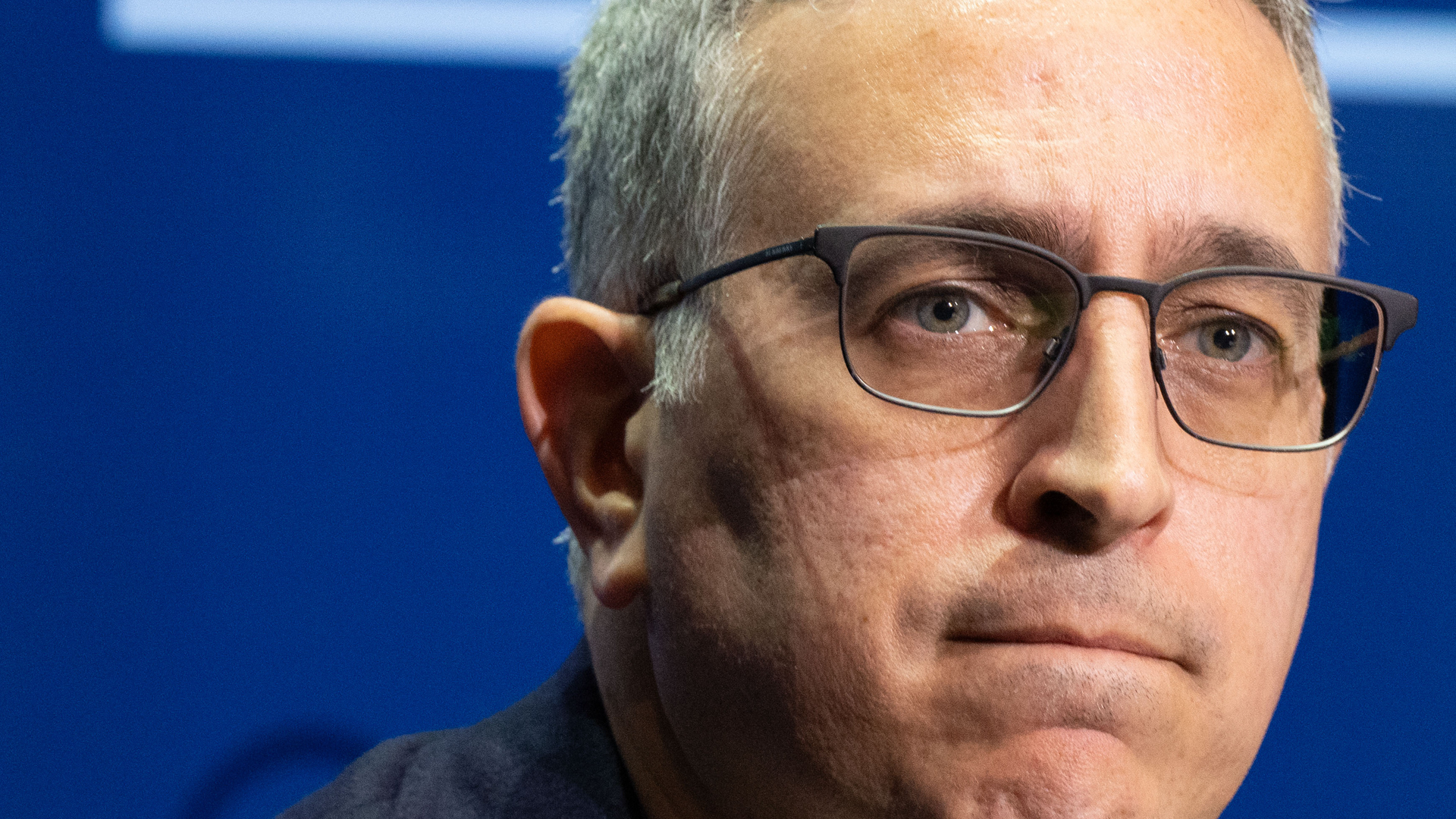
The 41st Parliament is the result of tectonic shifts in the Canadian political landscape. Before the election political observers, and more than a few political actors, were secure in the common wisdom.
The catechism of common wisdom ran something like this:
- No party can form a majority government in Canada without Quebec;
- The Bloc Québécois represents a fairly permanent (or at least short term) feature of the political landscape;
- The next election will result in another minority government;
- The New Democratic Party is waning in popular support;
- The Liberal Party will return as Official Opposition;
- Green Party candidates do not get elected.
All of this is now obviously wrong. Those caught in the swirl of Canadian political culture spend very little time wondering how they could have been so wrong. More energy goes into trying to rewrite the earlier projections to suggest that pundits saw this coming — some of it, or all of it. The political analysts are now trying to set in stone the characteristics of the “new normal.”
The new normal may assume that Stephen Harper as Prime Minister in a majority government has nothing but a primrose path before him — ineffective opposition, provincial counterparts unlikely to upset the federal Conservative apple cart, and a compliant caucus that will never thwart top-down control. Or not.
The new normal can involve assuming the Liberal Party will be rebuilt and become the Official Opposition in 2015, or form government in 2015. The new normal may assume the Liberal Party will slide into further decline.
The new normal will assume the Bloc Québécois has collapsed for good and that separatism is a relic of the past. Or not. And the new normal may assume one Green Party member of Parliament cannot make any real difference to the political landscape. Or not.
The only thing that is certain in politics is that nothing is certain. On May 2, no one imagined that by July 25 Canadians would be stunned by Jack Layton’s press conference announcing a leave of absence to concentrate on his health. No one had imagined Nycole Turmel would be interim leader of the Official Opposition. And despite the deep concern that Jack Layton was frighteningly changed in that July press conference, the news of his death brought summer to a close.
Canadian political life has rarely experienced the shared mourning and collective grief provoked by Jack Layton’s death. The only thing in living memory that comes close was the funeral train bearing Pierre Trudeau’s casket, as Canadians spontaneously lined the tracks. Still, the heartfelt grief and chalked walls of Toronto City Hall put me more in mind of the death of Princess Diana. And the reaction in Canada has also prompted us to ask, as the British did at the time, “what accounts for this? Why is this country so engrossed in grieving?”
The state funeral was also well outside of previous political experience. It was a gracious and noble gesture for the Prime Minister to offer a state funeral for Layton. It was a singular event. As has happened before in political life, but perhaps not in such high relief, the shared humanity transcended partisan practice. Sitting with members of all the federal parties, the tears were out of respect for Jack, but the emotions also reflected something above and beyond any one human being. It spoke to the potential that, despite our deep divisions, we could unite as one community. Will the call for greater non-partisanship, cooperation, inspiration and optimism in political life carry us forward into a new political normal? Is such a thing even possible. or will the 41st Parliament slide back from the shared sense of community to more routine ritualistic nastiness?
Of the major parties in Canada, two are guided by interim leadership. The expectation of Jack Layton serving as leader of the Official Opposition, a dream he had so skilfully manoeuvred into his reality, has been tragically ended. There will be much written of where the NDP will go from here. Scanning the media in the wake of Layton’s death, most commentators agree the NDP fortunes will falter without his leadership. They point to the fact that it was Layton’s personality, his jaunty wave of the cane in the 2011 election and his smile that captured so many seats. They could have said the same of the post-Broadbent NDP. A new leader could allow the NDP to continue to grow in strength and become government. Or the wave that washed in so many new seats in 2011 could wash them all away again in 2015. It is not for the leader of another party to speculate.
Those caught in the swirl of Canadian political culture spend very little time wondering how they could have been so wrong. More energy goes into trying to re-write the earlier projections to suggest that pundits saw this coming — some of it, or all of it. The political analysts are now trying to set in stone the characteristics of the “new normal.”
It is only a few months after the election and already we know that the “new normal” will shift as much as the “old normal.” The only thing that never changes is our collective propensity for “groupthink.” Once we can all agree on the key elements of the factors that will shape our future, we can relax. The fact that polls, pundits and spin doctors had just about everything wrong in the 2011 election is not something worth analysing. Everything will soon be back under control. Or so some would like us to believe.
Of all the variables in our political landscape, I have a role in only one. As the first elected Green Party member of Parliament, I represent a breakthrough for which thousands of volunteers have worked, not only in Saanich Gulf Islands, but across Canada. Will history see the Green Party victory in Saanich Gulf Islands as the beginning of growth that led to the Greens becoming a significant force in Canadian politics? Will my one seat be referenced in the same way as Deborah Gray’s one Reform seat? Will the fact we have one seat compare favourably to the two Progressive Conservative seats held in 1993 by Jean Charest and Elsie Wayne?
No question, our breakthrough is historic. No other federal political party has ever run full slates or nearly full slates in the previous three elections (2004, 2006, 2008) without winning a seat. Winning one seat for such a party is unprecedented. Other new political parties in recent history have made gains only from regional strengths, or more accurately, from regional alienation. No party in Canadian history has gained as many votes and run as many candidates in even one election without winning a seat as the Geen Party had done. That is until 2011.
The biggest obstacle to the election of Green Party candidates has been the assumption that a Green vote was a wasted vote. For some voters only the knowledge that a Green vote resulted in $1.90 in annual support to the party encouraged voting at all. And by the next election that incentive will be gone.
The firm belief that Green candidates could not win elections has kept strong and good candidates from winning in the past. Now that elected to the House of Commons, that barrier has fallen away. There are other barriers. The first-past-the-post (FPTP) system will continue to ensure that Green Party voters will be underrepresented in the House. We will continue to press for reform of our voting system. FPTP delivers perverse results for not only the Green Party, but also the electorate. As Peter Russell, Professor Emeritus in political science at University of Toronto, has pointed out, only FPTP can deliver the most undemocratic result of any democratic electoral process. He coined the term “false majority,” for situations like the 41st Parliament, where a minority of the popular vote elected a majority of members of Parliament. The phenomenon of a false majority has happened in the past — for Chrétien and Mulroney, once each. The fact that what goes around, comes around, does not excuse the perversity of the result.
A “new normal” that presumes the majority of Canadians will support the majority government is a serious miscalculation. It is just as likely that the notion of “Canada’s New Government,” the 2006-2007 tag line of the first Harper minority, will be fraying at the edges and be seen as threadbare. The notion of newness will be long gone. The call to a vision for the country will be muddled. Thus far, there is no sense of purpose beyond cutting the deficit it created.
Stephen Harper’s attempts to redefine Canada as a country embracing his values may succeed. It is too early to rule it out. If anything, Harper has shown himself to be a master tactician and skilful manipulator. But it is more likely that telling Canadians we are a warrior nation, as he did on Canada Day this year, will be met with dismay. Unless the Conservative Party morphs its values to more closely align with the majority of Canadians who chose to vote for other parties, the likelihood is of a stalled minority at the next election. Should the Liberal Party rebuild, or the NDP falter, the close ridings that made up the Conservative majority will once again revert to other parties.
Even with the lack of proportional representation, the results of the 2011 election will be hard to replicate.
It is worth fighting for a democratic voting system, but that fight will not be won before the next election, so Greens are working to ensure more Green Party MPs will be elected under our current system. We will have chances in by-elections, but our main chance will come in the next general election.
No doubt, the new conventional wisdom will consolidate around the accepted new normal discounting a future for the Green Party. I wouldn’t bet on it.
To ensure we succeed in the next election, the party is committed to building at the grassroots. We are the party that most appeals to young voters. So we must work to encourage the 18-25 year old voters to actually get to the polls. The next four years, despite the loss of the per vote subsidy, gives us the time to expand an already generous donor base. Building the party is our core agenda until the next election puts us to the test once again.
It is worth fighting for a democratic voting system, but that fight will not be won before the next election, so Greens are working to ensure more Green Party MPs will be elected under our current system. We will have chances in by-elections, but our main chance will come in the next general election.
To win many more seats we will need to be seen to be taking clear and principled stands on a wide range of issues.
In the brief parliamentary session of June 2011, as the leader of the party and MP for Saanich Gulf Islands, I had far more influence than had been anticipated by pundits. It was assumed widely that no one would know I was there. This assumption is grounded in ignoring the parliamentary system of our government. Each and every MP has rights and responsibilities. Most are unable to exercise any independent action because they operate under the complete control of their party whips. There is no need to study legislation and consider whether, as an individual MP, you are prepared to grant that piece of legislation “unanimous consent.” There is no point in even considering the matter if you are an MP in the Conservative, NDP, Liberal or Bloc Québécois parties. The decisions surrounding unanimous consent are determined for you. To chose to arrive at an independent conclusion is to court disastrous rebellion against the party brass. The same can be said of each and every vote, other than the rare “free votes” — but even there the wishes of the party leader are generally clear and the direction effective, if less draconian.
The reason for any profile or influence I had in the House was that I have the ability (one could say “duty”) of reading every bill and considering how I should vote and how the voters of Saanich Gulf Islands would like me to vote.
I never sought to object for the sake of objecting. Quite a few motions for unanimous consent went by without any effort on my part to delay or derail.
There were two instances when I would have withheld my consent. In one instance, the mega-trials bill, I learned of it in time to object. On the other, deciding to by-pass any review of $30 billion in spending, I missed my chance.
“Unanimous consent” does not require any vote. No bells ring to notify members of a call to vote. And it also does not require asking all MPs if they consent. The measures can be brought in when there is a bare quorum in the House and, if no one objects, the government has unanimous consent.
Luckily, on the mega-trials bill, I learned that the justice minister was proposing the unanimous consent route to combine first, second, and third readings and skip all hearings in order to pass the bill within hours. So-called “mega-trails” are those very expensive and complicated criminal processes with multiple defendants, usually involved in organized crime or terrorist activity. The bill had been introduced in the fall of 2010 but never made it to committee. It had never had a single day of hearings, but all the party bosses had agreed to fast-track the legislation.
While I support the goal of stream-lining the process for these trials to reduce the lag-time to justice and reduce the costs, I could not in good conscience support a bill that had never had a single day of hearings, and that had never benefited from the consultation of a single expert. So I denied my consent. The initial reaction was to try to paint me as someone who had never read the bill or who supported the Hells Angels. The release of 31 Hell’s Angels from jail in Quebec due to court delays had made this bill an urgent matter (not that passing it would get 31 Hells Angels back into jail). The only person from any party to approach me to discuss the bill was not a federal MP at all. Quebec’s Justice Minister Jean-Marc Fournier journeyed to Ottawa to press me to change my mind. I explained that I would support expedited hearings to get the bill passed. Within a day or so the federal justice minister agreed to hold hearings. By then, I had consulted leading criminal lawyer Clayton Ruby, who agreed it needed some changes. As well, the Liberal Party changed its view once former justice minister Irwin Cotler noticed the bill lacked a definition section and realized the complex mega-trial procedure could be applied to regular trials. As we headed into the hearings, I was optimistic the necessary amendments could be made and the bill passed within days.
In the hearings before the Justice Committee, the Canadian Bar Association, through a written brief, said the bill, as drafted, would not meet its goals. Even a Justice Department prosecutor showed up to point out the bill needed a key amendment to clarify appeal rights.
As an MP, not a member of the committee, I had a right to sit at the table. In order to ask a question or speak, the chair asked for committee members to agree. The NDP and Conservative members refused. Only the one Liberal said I should be allowed to ask a question. The excuse was that they had to go through clause by clause in a hurry. I kept trying to raise points, but the NDP and Conservatives would not allow me to utter a syllable. So the bill was rammed through, no changes allowed. I think the committee has made a serious mistake, as has the government and Official Opposition. Once the bill is in use, we will see how long it takes for errors to bring the bill back for amendments. Even flawed, I voted for its passage. I was never against the bill itself, nor its objects. I just want it to function properly.
The “unanimous consent” for which I missed my chance to object related to $30 billion in main and supplementary estimates. In another “time saving” measure, the Conservative, NDP, Liberal and Bloc leadership all agreed that the estimates would be deemed to have gone to committee, been studied and been reported back to the House a few days before the close of the June session. A journalist asked me if I had known the review of estimates had been eliminated. I was stunned by the news and asked the table clerk when it had happened. The call for consent occurred at 4 pm on June 2, within an hour of the Speech from the Throne. Usually, no serious business transpires in those few minutes. I had been in the foyer doing media interviews responding to the government’s agenda. It is all too easy to miss $30 billion in spending when unanimous consent is at work.
On the vote to extend the mission in Libya, I was the lone dissenting vote. Due to negotiation to allow the entire Libya mission debate to occupy no more than a day, I was allowed to give a speech on the floor, so long as I didn’t block the consent to limit debate. My view, and one shared by the vast majority of my constituents who have contacted me, was that we had gone beyond the “Responsibility to Protect” doctrine since the mission began. We had taken sides in a civil war. As I explained in my address to the House, I would have voted for the first phase of the mission. However, when the rebel forces rejected the option of a cease fire and peace talks, and as Canada and other nations proclaimed openly that the end-game was now regime-change, I could not vote to continue our military engagement. The NDP closed ranks with the Harper government to vote to continue bombing Libya. The Liberals and the Bloc also voted to extend the mission. The forced (whipped) vote meant that members of Parliament who opposed the bombing campaign were forced by the party bosses to vote to continue military action. Thus, the vote to continue the mission was 294-1. Certainly, the news from Libya at this writing is encouraging, but we will never know if a less bloody end to Gaddafi’s regime could have been achieved by more peaceful means.
The filibuster to block their regressive back-to-work legislation to end Canada Post’s lock-out of its workers was another occasion when I was visible, but I was unable to feel useful. What I wanted to see was a willingness to compromise from the government and the Official Opposition. I stayed in the House, with the exception of a three hour nap in the wee hours of Saturday morning, from Thursday to Saturday night. All in the hopes of cajoling, urging and asking senior members of both parties to end the lockout and the filibuster with minor changes to the back-to-work bill. In the end, I felt the whole exercise had achieved the status of Shakespearean drama. In MacBeth’s words, the filibuster was full of “sound and fury signifying nothing.”
I didn’t always vote against the government. I reviewed the series of small and beneficial measures described as the Budget Implementation Bill, discovered it didn’t really implement the budget at all, and voted in favour.
In Question Period, in response to routine questions and comments, and on a valid point of order, I spoke to a broad range of issues — for protection of our coast lines with a coast-wide tanker ban, enhanced testing of pharmaceutical drugs, the listing of asbestos as a hazardous product under the Rotterdam Convention, action to address the climate crisis, a transparent and accountable approach to deficit cutting, local food and food security, and respect and decorum in the House.
Based on what was admittedly a short session, I am hopeful that by 2015 Canadian voters will be used to looking to the Green Party for a reasoned and reasonable approach. And it is likely that the issues that right now define us — the environment and the climate — will be seen as part of what we stand for and not the whole of it.
Still, our identification with those issues is a large part of why it would be a bad bet to place your wagers against our growth.
It is the ultimate truism that nothing is certain about the future. Still, most media and political commentators focus on the economy as the complete measurement of the stability of our society. Others factor in security threats, within a mental construct that thinks of al-Qaeda.
The security threat of the climate crisis is ignored. Even the impact of climate change, when it happens, is ignored. The nightly news will broadcast the images of floods, fires, drought. The media cover such natural disasters with a predictability that becomes formulaic. For floods, we get ritual pictures of sand bags; we get photos of people in boats down the middle of a street. For droughts, we get cracked earth and distraught farmers. Tornadoes in Ontario. Collapsing stages in outdoor musical events. All freak events. We do not get explanations.
Between now and the next election, numerous variables relating to climate policy lie within the purview of Parliament, though beyond the control of the Green Party alone. There may be a total savaging of Environment Canada by the Harper government, or there may not. Since the May election, the blows have been many: a 40 percent cut in the budget of the Canadian Environmental Assessment Agency, 800 staff at Environment Canada fired, causing the disbanding of the Climate Adaptation Research Group, regulations to allow new coal plants instead of phasing them out. Different climate plans will be put forward. Most likely, the plans will continue to be more public relations exercises. With some significant shift in the political currents, it is possible the Harper government might make a genuine effort at climate action.
Nevertheless, the one certainty of the next four years will not be the political climate. It will be the instability of the global climate.
The build up of atmospheric carbon is not producing temperature changes year on year. The effects are felt in decadal shifts. Human-caused greenhouse gases throwing the global climate into disequilibrium will not be experienced in one year being warmer than the next. There are time lags. The worst impacts of our current emissions will be visited on the next generation. But it will be impossible to ignore the issue for another four years.
At some point, the climate emergency will eclipse our economic woes. The dots will connect from crop failure to environmental refugees to the oil sands and pipelines. Canadians will not be satisfied with the pale and recycled excuses of the other parties. The public will look to us as the one party with credibility on the issue.
The saying “the power of one” refers to the power of one lone individual to change society. And just as one person can change the world, it is hardly ambitious to imagine that one MP can change Parliament.
Photo: Shutterstock








